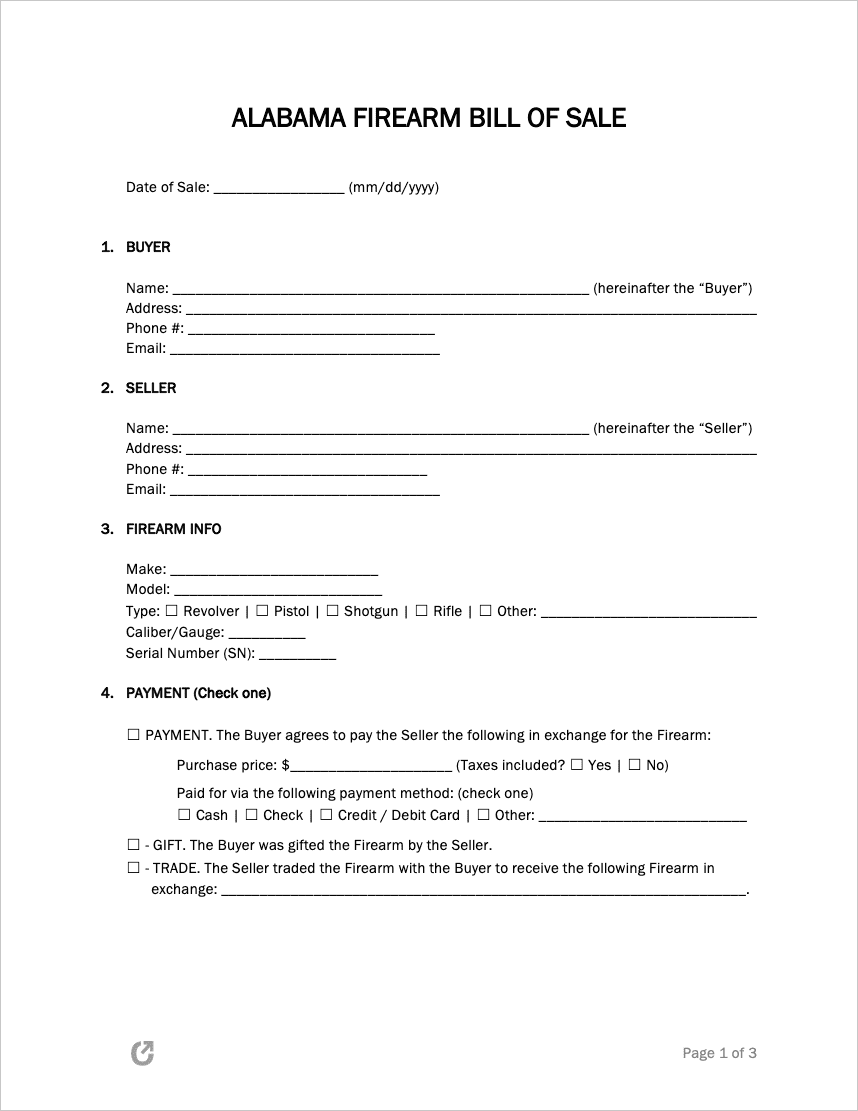Alabama Firearm Bill of Sale Form
An Alabama firearm bill of sale form is form that categorizes the sale of a firearm from one person or business to another.
In Alabama, the buyer and seller can conduct a private sale as long as neither party has a criminal or mental health record. Merchants can sell guns and ammunition to residents of other states if their state also allows it.
How to Apply for Alabama Concealed Carry Permit
Obtaining an Alabama concealed carry permit is relatively simple if the applicant is mentally healthy and does not have a criminal record. Gun dealers must perform a criminal record screening on interested buyers. This step is not mandatory during private sales.
Although the state does not require background checks for non-dealer transactions, the merchant cannot sell guns to felons, underage minors, or mentally unstable individuals. If private sellers do not comply with this law, state officials can issue fines or make arrests.
Step 1 – Determine Eligibility
Residents commonly apply for pistol permits because they lessen carrying restrictions. To register, the applicant must be at least eighteen (18) years old, mentally stable, and in good standing with the law (§ 13A-11-75).
Step 2 – Give Forms to County Office
Since each county has special laws for registration, the interested party should refer to local law before applying. Researching registration documents and submission requirements ensures they provide the correct information as needed. The applicant can find this information by locating their county law officer.
Step 3 – Pick up Permit
Applicants must wait thirty (30) days to pick up the firearm permit after being approved. This waiting period is in place to protect residents from potentially dangerous criminals planning to misuse the license. Extending the date to one month also significantly lowers the chances of individuals harming themselves or others.
Step 4 – Renew
Concealed carry permits in Alabama last for up to five (5) years at a time. The renewal process for license holders is less complex than a first-time registrar. That said, the individual must reapply before the expiration date. If they miss the deadline, they must pay additional fees or restart the process as a new applicant.
Frequently Asked Questions (FAQ)
Alabama firearm laws protect residents and their communities. Individuals must obey current statutes when buying, selling, or using a gun within state borders. The following list provides answers to commonly asked firearm questions.
1. Are Firearms Allowed in Alabama State Parks?
No, generally, firearms are not allowed in Alabama state parks. However, the state park manager can give an individual permission to carry a gun on park grounds in exceptional cases. In addition, law enforcement officers and licensed individuals can holster a firearm in the park if they abide by local law. Residents can use the gun in self-defense but cannot carry out target practice, harm parkgoers, or hunt wildlife.
2. Can I bring a firearm into a public place in Alabama?
Being an “open carry” state, Alabama allows residents to have their guns in plain sight without a permit. According to Article I, Section 26 of the Alabama Constitution of 1901, citizens have a right to bear arms to defend themselves.
Although guns are allowed in public places, the state limits open carry laws. Unless the individual holds a license or receives permission, they cannot possess a firearm in the following locations:
- Patrol stations (highway, sheriff, or police);
- An area where the county or city council members meet (criminal justice buildings, courthouses, and other meeting buildings);
- Facilities used to incarcerate individuals (jails, prisons, or detention facilities);
- Facilities for mental health;
- Public protests, rallies, marches, or group walks;
- Sports fields or arenas (sponsored by a school or professional); and
- Areas designated for wildlife management (without a permit).
3. Are firearms without serial numbers illegal in Alabama?
It depends. Firearms manufactured before October 22, 1968, and homemade guns do not require serial numbers.
Guns manufactured after October 22, 1968, must have a unique serial number. Federal law prohibits owners from tampering with the label. Police can arrest owners and charge them with a Class C felony if they remove, vandalize, or alter the number (§ 13A-11-64).
4. Can a convicted felon own a firearm in Alabama?
No, a convicted felon cannot own a firearm in Alabama. A “convicted felon” means the individual has been accused of a crime and served at least one (1) year in prison.
Although uncommon, felons can get their gun rights back in Alabama. This change only occurs if the court clears their conviction or the Parole Board allows it.
Since private sales do not require background checks, the merchants must ensure the buyer is not a felon. The state can arrest individuals who sell a firearm to another person who has a criminal record.
5. What are the reciprocity laws in Alabama?
Alabama law allows out-of-state visitors to “concealed carry” as long as they have a valid permit from their state of residence. However, they do not acknowledge New York City licenses and only let Florida residents “concealed carry” handguns (§ 13A-11-85).
